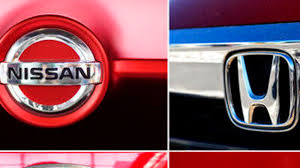
According to the Nikkei newspaper on Thursday, Japanese manufacturers Nissan Motor and Honda Motor are thinking about lowering their expenses by collaborating on electric car charging and utilising standardised automobile software.
In March, Nissan and Honda announced their consideration of a strategic alliance for the production of electric vehicle (EV) components. The goal of this alliance is to increase Nissan's and Honda's market share in the growing worldwide EV industry.
The third- and second-largest manufacturers in Japan were seeking to collaborate on developing the vehicle's operating system in an effort to save expenses, Nikkei said, without citing its source.
According to the Nikkei, Nissan and Honda are reportedly exploring collaborating in six areas as part of their possible cooperation. They might also work together to improve the charging infrastructure to raise their competitiveness in EVs.
Nissan CEO Makoto Uchida stated in March that the company is willing to collaborate in any area, both domestically and internationally.
Although officials of both manufacturers stated that the businesses were looking into other forms of cooperation, Nissan and Honda declined to comment on the Nikkei article.
In the fiercely competitive global EV industry, Nissan and Honda—which led the way with the 2010 Leaf—are facing mounting competition from the likes of Tesla, and Chinese and South Korean automakers.
Both Japanese manufacturers have suffered greatly in China, their main market, as buyers have switched to low-cost, software-loaded electric vehicles made by Chinese firms like BYD (002594.SZ), opens new tab.
In the first five months of this year, Nissan sold little over 50,000 electric vehicles globally, or 3.5% of its 1.4 million total sales worldwide.
In the first three months of 2024, Honda sold 3,190 electric cars (EVs), or 0.3% of its total retail sales of roughly one million vehicles worldwide at that time.
(Sourec:www.usnews.com)
In March, Nissan and Honda announced their consideration of a strategic alliance for the production of electric vehicle (EV) components. The goal of this alliance is to increase Nissan's and Honda's market share in the growing worldwide EV industry.
The third- and second-largest manufacturers in Japan were seeking to collaborate on developing the vehicle's operating system in an effort to save expenses, Nikkei said, without citing its source.
According to the Nikkei, Nissan and Honda are reportedly exploring collaborating in six areas as part of their possible cooperation. They might also work together to improve the charging infrastructure to raise their competitiveness in EVs.
Nissan CEO Makoto Uchida stated in March that the company is willing to collaborate in any area, both domestically and internationally.
Although officials of both manufacturers stated that the businesses were looking into other forms of cooperation, Nissan and Honda declined to comment on the Nikkei article.
In the fiercely competitive global EV industry, Nissan and Honda—which led the way with the 2010 Leaf—are facing mounting competition from the likes of Tesla, and Chinese and South Korean automakers.
Both Japanese manufacturers have suffered greatly in China, their main market, as buyers have switched to low-cost, software-loaded electric vehicles made by Chinese firms like BYD (002594.SZ), opens new tab.
In the first five months of this year, Nissan sold little over 50,000 electric vehicles globally, or 3.5% of its 1.4 million total sales worldwide.
In the first three months of 2024, Honda sold 3,190 electric cars (EVs), or 0.3% of its total retail sales of roughly one million vehicles worldwide at that time.
(Sourec:www.usnews.com)














